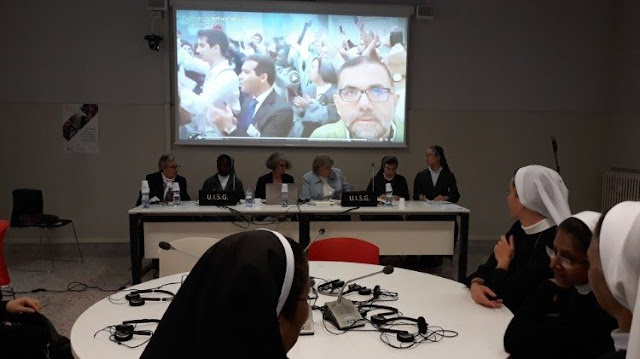A Synod transformed by the
presence of young people
 |
| Womenreligious unpack the Synod experience. |
One day after the Synod on Young People concludes, 6 of the
7 women religious who participated share their experience of how they saw the
Synod transformed by the presence of the young auditors.
By Sr Bernadette Mary Reis, fsp
A synthesis of the Synod on Young People through the eyes of
6 of the 7 women religious who participated, organized by the International
Union of Superiors General (UISG) in Rome, took place on Monday evening, the
day after the Synod formally concluded. Women religious, ambassadors to the
Holy See, and journalists took part in person while others joined online via
webinar.
Sisters auditors and voting
Sr Sally Marie Hodgdon, representing UISG as a Superior
General at the Synod, responded to the question regarding parity with the male
Superiors General counterpart, USG. She said the executive boards of both the
UISG and USG have decided to draft a document. In it, they will request that
the numbers of auditors from both groups be the same, and that both have voting
privileges. She added that this issue was brought up not only by women, but by
Bishops, Cardinals and the young people as well.
Synodality
Sr Allesandra Smerilli, a Salesian Sister, described the
listening that led to conversion. Referring to Cardinal Tagle, she said that
the listening took place not only with the ears, but also with their gut. Many,
including Bishops, were moved by the stories that they heard. This, Sr
Allesandra said, provides the backdrop to the addition of synodality in the
Final Document which is absent from the Instrumentum Laboris (par. 118ff). A
synodal journey took place and transformed the Bishops from defending their
authority to embracing synodality. Sr Allesandra said it is because of the presence
of the young people that the Bishops began to speak about their personal
“synodal” experiences, and were able to articulate it in the Final Document.
Festival
Sr Mina Kwon, a Sr of St Paul of Chartres from Korea, called
the Synod a festival. She was surprised each day by what God prepared.
Throughout the month, the young auditors began to understand that the Church
loves them, she said. It was not just the Bishops, but the young people, too,
who were talking about what they plan on doing when they return to their
countries.
The signs of the times
Sr Lucy Muthoni Nderi, a Salesian Sister from Kenya, said
that it was the young people who helped the Bishops identify the signs of the
times. The young people reminded the bishops not to talk about them as if they
are outside of the Church, but as people ready to help in the Church’s mission.
This, she said, is how they awakened synodality.
New Pentecost
Sr Nathalie Becquart, a sister of the Xavière Missionaries
of Christ Jesus, feels that the Synod is a new Pentecost. She said she could
hear the voices of young people in the Bishops. The strong and deep human
experiences lived in the Synod helped the Bishops live the Emmaus encounter
that became the paradigm of the Final Document. Through this experience they
have understood that young people can be partners in the mission of the Church.
It also affected the paragraph on man and woman (13), and the paragraph
specifically on women in the Church (55), she said. Sr Nathalie emphasized as
well that the Bishops and Cardinals at the Synod were asking for women to be
present in the decision-making process.
Pilgrimage
Sr Maria Luisa Berzosa González, Director of Catholic School
and Popular Education from Spain, took part as an expert. As an expert, she did
a lot of listening and because of that began to understand a lot. The
pilgrimage, the intergenerational dialogue, and the concert with prisoners were
other ways that shaped the experience, she said. She drew particular attention
to the pilgrimage. That was when everyone was equal, providing support, handing
someone water…. Sr Maria Luisa thinks that the pilgrimage played a large role
that allowed the Bishops a concrete experience within which to understand
synodality.
Không có nhận xét nào:
Đăng nhận xét